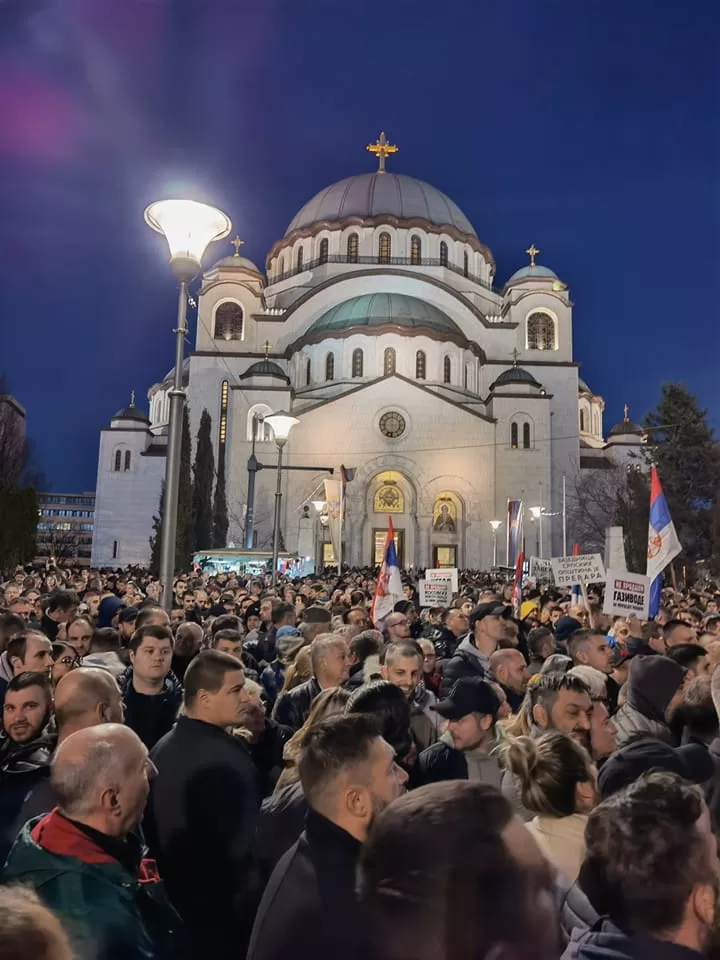Last week, a public call to protest on Friday 17th March was announced by the leaders of four of the most influential nationalist political parties in Serbia today. The reason for this call to action was the scheduled meeting between Serbian President Aleksandar Vučić and Kosovan Prime Minister Albin Kurti in the North Macedonian city of Ohrid on Saturday 18th March. The reason for this meeting was to discuss the potential implementation of a Western-backed agreement – known to Serbs as an ultimatum – regarding the so-called “normalisation” of relations between Serbia and the unrecognised state of Kosovo, which unilaterally declared independence in February 2008 and still does not hold the status of a full sovereign state, due to limited international recognition (just over 50% of the United Nations actually recognises Kosovo as independent). However, following the agreement’s leaking in the form of an online document a couple of months ago, the so-called “agreement” resembled more an ultimatum against the Serb people, with “normalisation” being an alternative term used for the de facto recognition of Kosovo’s independence by Serbia. If Serbia refuses to accept the conditions of the agreement, then Western powers, such as the EU and even NATO, could consider imposing some sanctions against Serbia until they formally recognised Kosovo. Future demands by the West on Serbia have already been predicted to be the imposition of sanctions against Russia – Serbia’s closest geopolitical ally – as well as the formal alignment of Serbia’s foreign policy with those of the EU and, by extension, NATO. This also does not rule out the possibility of the West demanding that Serbia send vast swathes of money and lethal military aid to Ukraine.
The nature and timing of the organised protest against President Vučić and the discussing of the so-called Franco-German agreement is significant not only because it is a protest against the Serbian government and the ruling Serbian Progressive Party’s policies towards Kosovo and other aspects of its foreign and domestic policies, but also because the 17th March is an important date in the Serbian calendar of the 21st century.
The March 2004 Pogrom in Kosovo
On the 17th March 2004, mass ethnic rioting and destruction took place across the then-autonomous province of Kosovo in Serbia (international law dictates that it still remains a legal, autonomous province of Serbia, as per United Nations Resolution 1244). Just over the course of 24 hours, tens of thousands of ethnic Albanians rampaged against the local Serb population of Kosovo in what was the single worst day of violence in the territory since the war of 1998–1999. The riots and pogrom resulted in the confirmed deaths of 16 Serbs, 11 Albanians and the forced expulsion of thousands of Serbs and other minority groups (predominantly gypsies) from their ancestral homeland. Almost 1,000 homes and 35 Serbian Orthodox Christian churches and monasteries were also damaged or destroyed in the violence. Much of these acts of violence were recorded on video and in photographs. The destruction had also prompted UNESCO to label the medieval Serbian churches and monasteries remaining in Kosovo as “World Heritage Sites in danger”. Ironically – and very telling of their general attitudes towards Serb cultural and ethnic heritage in Kosovo – the ruling Kosovar Albanian government continues to try and take Kosovo into UNESCO as a member state, thus identifying Serbian cultural and religious Heritage Sites in the region as “Kosovan”, not Serbian.
The March 2004 pogrom served as a harrowing reminder to the world that even after the end of the war that killed so many thousands of people on both sides of the conflict of 1998–1999, the Western world and the so-called international community continue to do little to help the remaining Serbs in Kosovo in a land that is, even according to the UN, a legal province of Serbia. It seems as though UN and KFOR peacekeepers in Kosovo are simply not interested in doing their jobs and keeping the peace if the victims of the ongoing ethnic violence and persecution are Serbs.
The No Capitulation Protest
I personally had the honour of attending the appropriately-named No Capitulation protest in Belgrade, Serbia last Friday, and it was no surprise whatsoever to see that the public call-to-action by the most influential of Serbian nationalist parties – who will be spoken about in more detail in due course – was extremely successful, with thousands of people from all walks of life turning up to show and voice their opposition to the pro-Western policies of President Vučić and the Franco-German ultimatum. Reports have indicated that approximately 15,000 people turned up for the protest and subsequent march, but this has not been confirmed. Most media outlets put the number at less than 10,000. However, the media in Serbia is mostly controlled by the state and is largely pro-government in nature.
To briefly touch upon the attitude of the Serbian government towards this protest, almost every bus that was booked to transport activists from their respective home cities to Belgrade for the protest had been stopped by the police for unclear and arbitrary reasons. These incidents had been reported to the organisers, and it was abundantly clear that the authorities were tipped off by the Serbian government to cause unnecessary trouble and delay for the activists, before eventually allowing the buses to continue on their respective journeys, albeit following long waits that lasted between 30 minutes to an hour. Many cars being driven towards Belgrade carrying activists were also stopped by the police for a time.
Unnecessary – yet planned – traffic delays by the state authorities were not the only form of state opposition against the protest and the attendees. Banners unfurled on bridges leading into Belgrade itself accusing nationalist party leaders of being “fascists” etc. were further attempts by the state to discredit the leading nationalist figures of the country. However, not a single vehicle horn was sounded in support of the messages that these banners were promoting. Instead, banners in support of the protest were met with several vehicle horns being sounded, in turn supportive of the nationalist organisers and activists.
From 7:00 pm local time, with nationalist and religious banners and icons unfurled and held high, the march commenced from the enormous Saint Sava Church and slowly made its way from there to the statue of Tsar Nicholas II of the Russian Empire, a few hundred metres opposite the Serbian Parliament. A symbolic location, given Serbia’s long-standing historic, brotherly ties with the Russian nation and a show of solidarity to Russia in these difficult geopolitical times. From start to finish, the march involved the singing of Serbian folk, religious and nationalist songs, as well as the chanting of pro-Serbian, pro-Russian and anti-Vučić slogans. Small drones operated by unknown people (most likely the media) buzzed high overhead, taking photos and videos of the entire procession.
Once at the statue of Tsar Nicholas II, a stage lit up with the red, blue and white colours of the Serbian national flag welcomed the procession and a public performance of the Serbian national anthem, “Bože Pravde” (God of Justice), was given. A young female activist hosted the event and introduced several key guest speakers, which included professors and doctors from the local universities, other notable activists and even a youth organisation that promotes Serbian cultural and national interests, all of which are against the influence of the West.
Out of all of the guest speakers at the event, four in particular stood out, considering that these four, as stated prior, represent the most influential Serbian nationalist political parties in the country.
The first party speaker was Vojislav Mihailović, President of the Movement for the Restoration of the Kingdom of Serbia (POKS). It probably needs no explanation as to what the party stands for, given its name, but monarchism is an increasingly popular sentiment among Serbs today, with the majority of Serbs backing the return of the monarchy and the return of Serbia to a kingdom, leaving behind the republican system. It is worth noting here as well that Vojislav Mihailović is the grandson of famed Second World War Serbian nationalist royalist resistance leader Dragoljub “Draža” Mihailović. Each of the four guest party speakers generally spoke about the same subject matter, in relation to the nature of the protest itself, but each speaker also expressed themselves in their own unique manners, with each also adding in something special to each of their speeches. For Vojislav Mihailović, reading from papers which bore the words for his speech, the emphasis was on the importance of the long-overdue restoration of the Serbian monarchy, especially at a time when the Serbian republican system and the presidency are failing the people and refuse to carry out the will of the people. This will of the people consists of refusing to recognise and “normalise” relations with the ethnic Albanian government in Kosovo, the desire for the strengthening of ties with Russia and China on a more fundamental level as our allies and the permanent ending of Serbia’s accession negotiations into the European Union.
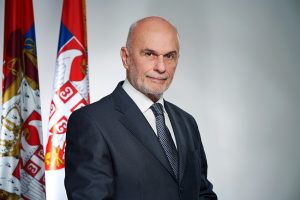
Vojislav Mihailović, leader of the Movement for the Restoration of the Kingdom of Serbia (POKS)
The second party speaker of the night – and bearing the national flag of Serbia proudly upon walking onto the stage – was Milica Đurđević Stamenkovskii, the young leader of the Serbian Party Zavetnici (SSZ) [roughly translated into English as the ‘Oathkeepers’]. At only 32, Milica is one of the youngest party leaders in Serbia and one of the youngest MPs in the country. Despite her youth, she has been an activist for Serbian national and cultural interests since she was a teenager and has ultimately led her party to the status of being the largest nationalist party in Serbia today. Her youthfulness and steadfast pride in her homeland were very much evident in her speech, denouncing President Vučić and rallying the Serb people around the common cause of protecting Kosovo as an integral part of a sovereign Serbia. Milica delivered her words in a manner that was powerful yet poetic, almost as if she were starring in a grand stage production and reciting lines from Serbia’s epic folk poems of old. As has always been the case consistently with Milica and her stance on Serbian affairs, love of country and unity of the Serb people are values which she frequently places at the forefront of her ideals, and it was no different tonight when it came to the content of her speech – love Serbia, unite the people and oppose the pro-Western policies of President Aleksandar Vučić. Even being heavily pregnant with twins did not stop her from addressing her people with a passion that one rarely ever sees among Western leaders anymore and garnering rapturous applause from the entire crowd as a result.
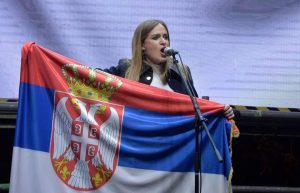
Milica Đurđević Stamenkovskii, leader of the Serbian Party Oathkeepers (SSZ)
The third party leader to speak was Boško Obradović, from the nationalist Dveri party. A tall figure with a strong history in Serbian politics, Obradović echoed much of the same sentiments as the previous two party leaders who spoke that night, albeit with an especially strong emphasis on the need to unite the Serb people regardless of their ideological affiliation, left or right, against common threats against the nation, both domestic and foreign. It is important to note here that the left-right divide in Serbia mainly stems from differences in how economic matters are tackled, less so social and cultural matters, since patriotic sentiment is strong among both left-wing and right-wing Serbs. The main exception would be supporters of centre, liberal parties, the vast majority of which do not enjoy very much popular support, given Serbia’s lack of interest in liberal ideology. In a country that suffers from an unfortunately high level of social division based on party politics, this rhetoric of popular unity and solidarity with kinsmen from all walks of Serbian life was a fundamental element of Obradović’s speech. The reception that he received from the crowd evidently showed that his views were indeed supported unanimously.
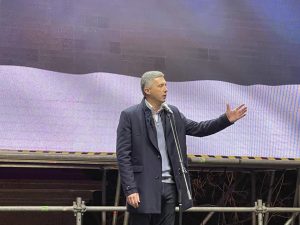
Boško Obradović, leader of the Dveri party
The fourth and final party leader to speak that night was Miloš Jovanović from the New Democratic Party of Serbia (NDSS). Listening to Jovanović’s speech, one would not think for a second that his party used to be ideologically centre-right. The rhetoric of Jovanović during his speech was akin to the sentiments of the previous three nationalist speakers before him, further signifying that the old Democratic Party of Serbia (DSS), prior to Jovanović’s rise as party leader, has changed for the better into a more nationalist and defiant party, ready to stand up to the regime of the ruling Serbian Progressive Party and President Aleksandar Vučić. In fact, these elements of Jovanović’s speech made his speech the most pleasantly surprising one of them all. At one point, Jovanović had even outright declared, “Vučić must go!” While many within Serbian society would want little more than for Vučić to resign and go, it is rare that a prominent party leader outright declares to a mass audience that the president must leave office. Another highlight of Jovanović’s speech was his advice to the Serbian nation to “be ready”. What this means exactly has been interpreted to mean that in the event of the Serbian government capitulating to the West and giving in to the West’s demands for Serbia’s de facto recognition of Kosovo and/or the sanctioning and severing of ties with Russia, the Serbian people are expected to make their voices heard even louder than ever before in the nation’s recent history. It was rhetoric such as this which made Jovanović’s speech a key highlight of the night and indicates that he – alongside the other three party leaders of the night, Vojislav Mihailović, Milica Djurdjević-Stamenkovski and Boško Obradović – has established himself as one of the most important and key nationalist figures in Serbia today.
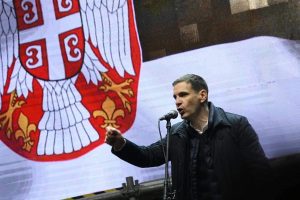
Miloš Jovanović, leader of the New Democratic Party of Serbia (NDSS)
The Outcome of the Ohrid Meeting & What Lies Ahead
The following day, on Saturday 18th March, in Ohrid, North Macedonia, Serbian President Aleksandar Vučić and Kosovan Prime Minister Albin Kurti made a formal agreement to implement the Franco-German document with regards to the normalisation of relations between Serbia and breakaway Kosovo. While nothing was signed on paper (yet), the European Union and the United States continued to claim that the verbal agreement between the two leaders was “legally binding”, which, in effect, means that President Vučić had indeed de facto recognised Kosovo as an independent country, thus paving the way for the territory to formally join the UN, EU and NATO in the future. As one would expect, a wave of anger erupted among the Serb people, and another protest event has already been planned to take place outside of the Serbian Parliament on Friday 24th March, on the 24th anniversary of the NATO bombing of Serbia, which took place amidst the Kosovo War itself. The event is scheduled to begin precisely at 12:44 pm, symbolising UN Resolution 1244, which explicitly states that Kosovo is to remain an autonomous territory within the Republic of Serbia.
Exactly how the event itself will unfold in comparison to last Friday’s protest and march remains to be seen, but if the ever-growing popularity and influence of Serbian nationalist politicians is to serve as an indicator, there is no doubt that this upcoming protest will be just as important as the ones that came before, and most likely every single one that comes after it, unless President Vučić either backtracks on his many failed policies, domestic and foreign, or outright resigns from his position as President of Serbia. After all, the Serb people had indeed made themselves very clear with their message to Vučić, the Albanian regime in Kosovo and the West – no capitulation.
